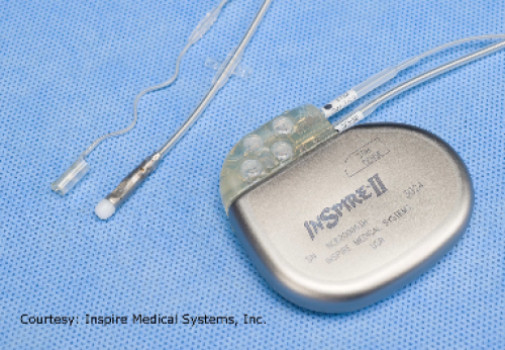
University Hospitals (UH) Case Medical Center is the first in Ohio and among the first in the United States to begin offering a new FDA-approved treatment for obstructive sleep apnea (OSA).
This first-of-its-kind treatment consists of a small implantable system called Inspire™ Upper Airway Stimulation (UAS) therapy. It has been clinically proven to significantly reduce sleep apnea events and improve quality of life for people who cannot tolerate continuous positive airway pressure (CPAP).
UH Case Medical Center was one of the clinical study sites for the Stimulation Therapy for Apnea Reduction (The STAR Trial) study, and the findings were published in the New England Journal of Medicine (Jan. 9, 2014). The STAR trial results showed that Inspire therapy reduced apnea events by 68 percent and significantly improved key quality of life measures.
More than 18 million Americans suffer from Obstructive Sleep Apnea (OSA), which is characterized by repeated episodes of upper airway collapse during sleep. Patients with OSA stop breathing frequently during sleep, often for a minute or longer. “Sleep apnea is as prevalent as adult diabetes and asthma and the consequences of OSA range from disruptive to life-threatening,” said Kingman Strohl, MD, who was the principal investigator for the study at UH and co-author of the NEJM article. “While many patients have found help with CPAP, for some patients it is too difficult to use, and thus ineffective.”
Inspire therapy senses breathing and delivers mild stimulation to key airway muscles, which keeps the airway open during sleep. Using a handheld programmer, patients can control when the Inspire therapy is turned on or off. In contrast to other surgical procedures to treat sleep apnea, Inspire therapy does not require removing or permanently altering a patient’s facial or airway anatomy.
“Inspire therapy is an important addition to the options that we can offer to patients with obstructive sleep apnea,” said Diana Ponsky, MD, an otolaryngologist who will be one of the ear, nose, and throat surgeons implanting the system at UH. “Untreated moderate to severe OSA places patients at increased risk for cardiovascular disease, accidents, and death. Inspire therapy provides us with an effective new treatment to use in a select group of our CPAP intolerant patient population.”
Story Source:
The above story is based on materials provided by University Hospitals Case Medical Center. Note: Materials may be edited for content and length.
